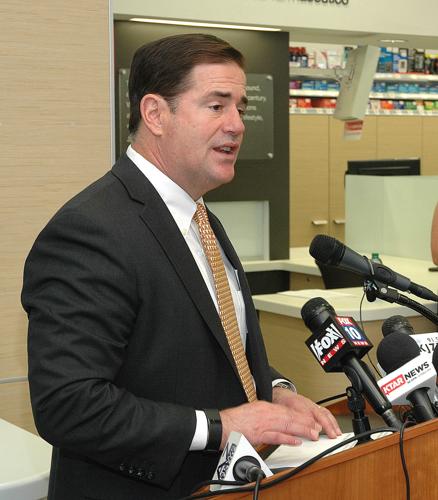PHOENIX — The Ducey administration goes to court next month to defend expansion of a health-care program for the working poor the governor never wanted in the first place.
The lead attorney for the Arizona Health Care Cost Containment System wants the Court of Appeals to rule that the $265-million-a-year levy on hospitals that finances the expansion was legally enacted.
Douglas Northup concedes the plan did not get a two-thirds vote from the House and Senate in 2013, something the Arizona Constitution requires for any new or expanded tax. There were enough Republican lawmakers who opposed the levy — the ones who are now trying to have it declared illegal — to deny it that margin.
But Northup contends the levy is not a tax but instead simply a variable “assessment” to pay for a specific program.
Part of what makes the litigation — and the governor’s defense — so unusual is that Ducey openly opposed the AHCCCS expansion when he was running for governor.
Gubernatorial press aide Daniel Ruiz said Thursday that, for the moment his boss is “monitoring the issue” as it makes its way through the courts. “We continue to follow the law and will change course if necessary based on the court’s ruling,” Ruiz said.
But the possibility the governor might provide a less-than-vigorous defense of the law pushed through by predecessor Jan Brewer got the attention of Maricopa County Superior Court Judge Katherine Cooper. She agreed to allow attorney Tim Hogan, representing those who could lose coverage, a seat at the defense table.
Hogan said it’s not just that Ducey, as a candidate, “actively opposed Medicaid expansion.” He also pointed out the governor chose a health-care adviser from the Goldwater Institute, which also opposed what Brewer engineered.
But whatever Arizona courts decide ultimately could be academic.
The expansion is financed on the federal side by the Affordable Care Act. And if Congress follows through with its threat to repeal the law without replacing it with something else, the program self-destructs.
Prior to 2013 AHCCCS, the state’s Medicaid program, provided care for those below the federal poverty level.
Under the ACA, Congress agreed to pick up most of the costs for expanding health-care coverage to those making up to 138 percent of the federal poverty level. That is currently about $27,820 a year for a family of three.
To get those funds, however, the state had to restore coverage for childless adults, which had been dropped years earlier in a budget-saving maneuver. And to cover that cost and other state expenses, Brewer proposed — and lawmakers approved — giving AHCCCS Director Tom Betlach authority to impose a charge on hospitals.
The plan was adopted by a simple majority of the House and Senate, with the Republican governor cobbling together a coalition of Democrats and some members of her own party to vote for it.
Hospitals did not object because Betlach set it up so every hospital chain actually would make money from the deal: More patients with government-provided insurance coverage means fewer bills written off as bad debt because of a person’s inability to pay. Betlach even structured it so some hospitals that do not benefit from Medicaid expansion pay nothing.
Despite that, the lawmakers who voted against expansion sued.
They point out that a state constitutional amendment requires a two-thirds vote of each chamber any time a new tax is imposed. The levy on hospitals did not get that margin.
If the courts decide it really is a tax, that means it was enacted illegally and goes away — as does the expansion and the care for the 400,000.
The case is now before the Court of Appeals after Maricopa County Superior Court Judge Douglas Gerlach sided with AHCCCS.
In legal papers filed in the case, Northup told the appellate judges the state’s participation in Medicaid has been good for the state, and not just because more people have coverage. He said the total federal contribution for the expanded program over a two-year period was about $2 billion.
And, if nothing else, Northup contends a strict reading of the Arizona Constitution backs his contention that the levy is not the kind of tax that requires a two-thirds vote.





